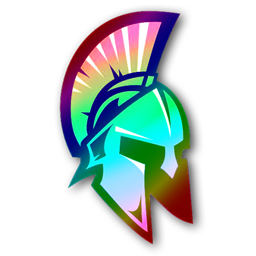The PC-88 Remix base is a custom 8-bit Sparta base invented by Jedi787plus arranged with old command-line computer music tools rather than sophisticated user-friendly software, in much the same way as its 16-bit PC-98 Remix counterpart.
thumb|320px|right|This Is Sparta! (PC-88 Remix)
Technical Background
The PC-88 Remix base, like Tachin1994's Mario Remix base, is based on old-school programmable sound generation (PSG) (called software-controlled sound generation or SSG by famous soundchip maker Yamaha). This was basically the type of sound used to generate music for almost all sound-capable 8-bit computer, arcade, and video game platforms during the 1980's. However, unlike Tachin's Mario base, which made use of square-wave, triangle-wave, and pseudo-noise tones (the types of tones generated by the PSG module in the Nintendo Entertainment System/Famicom's Ricoh 2A03/2A07 CPU), the PC-88 base only uses square-wave and pseudo-noise tones, the only types of tones supported by the General Instruments AY-3-8910 PSG chip which was also sold under license as the Yamaha YM2149/SSG soundchip as found on early Japanese NEC PC-8801 8-bit home computers (also called PC-88 and thus the name of this base, although most later PC-88 computers used instead the more sophisticated 16-bit Yamaha YM2203/OPN and YM2608/OPNA FM+SSG soundchips most typically associated with PC-98 - indeed, both OPN and OPNA chips integrated the YM2149/SSG as a module for backwards-compatibility purposes).
Melody is implemented as pure square-wave tones on SSG channels #1 and #2, while percussion --the type of percussion done by Jun'ya Ota (太田順也 or ZUN) to be exact-- is implemented as a mixture of square-wave and pseudo-noise tones (depending on the type of percussion to apply, as determined by the special MML "@" preset commands) on SSG channel #3 via the virtual "K" rhythm channel.
thumb|320px|left|Tonight We Dine in Hell! (200-Subscriber Special #1)
Usage
The base itself (no remix) was uploaded on December 15, 2009. Jedi787 recomments potential remixers to remix it with authentic 8-bit audio sources, regardless of whether they come from NES, Game Boy, Sega Master, Atari 2600, MSX, PC-88, or early arcade games.
Nevertheless, GhostVenom051 remixed this base with a non-8-bit audio source to get Here's Johnny (V3).
For his 200-subscriber special, Jedi787 intentionally degraded the famous "Tonight We Dine in Hell" quote from the movie 300 to 8-bit, 8-kHz (WAY VERY LO-FI) quality, then compressed it to 4-bit ADPCM format (the NES's 2A03/2A07 CPU/soundchip had a rarely-used DPCM channel that sounded much like this) before remixing it into Tonight We Dine in Hell! (Sparta PC-88 Remix), so it sounds like "authentic 8-bit" old-school audio.
Tools Used
This base (like its PC-98 counterpart) was written in Music Macro Language (MML), a plain-text-based approach to music composition that is typically used by old, experienced chiptune makers (younger chiptune makers prefer to use modern, more user-friendly "trackers" or even FL Studio, Supdawg's favorite tool) and was largely used by video game music composers for both 8-bit and 16-bit music. MML syntax varies from one gaming platform to another and also from one compiler to another; the specific kind of MML used for this Sparta base was PMD98 MML, invented by Masahiro Kajihara (梶原正裕 or KAJA) in 1989 and used by many PC-88 and PC-98 game music composers.
The MML compiler used to compile this base into KAJA's P.M.D' or PMD98 music format (.M, .M2, .M26, .M86) was MC.EXE, a command-line compiler that can only be run on Microsoft's old MS-DOS operating system; to run it on modern operating systems like Windows 2000/XP/Vista/7 (especially the 64-bit versions of XP/Vista/7), Linux, or Mac OS X, you will need a DOS emulator like DOSBox (which emulates an IBM PC-compatible) or Anex86 (which emulates a NEC PC-98-compatible). Although the "PMD98" moniker suggests PC-98, this music format was actually playable on both PC-88 and PC-98 systems - only the music player had to be rewritten for PC-88, on which case it adopted instead the "PMD88" moniker.
The obscure P.M.D file format only stores the notes, note lengths, instrument definitions, and other music-control commands that are sent to the soundchip (in much the same way General MIDI stores notes, note lengths, instrument assignments, and other controls that are sent to the keyboard's, or soundcard's, MIDI driver), rather than actual waveforms as is done on sampled audio formats like uncompressed PCM (.WAV, .AIF, .AU), MPEG Audio Layer 3 (.MP3), Windows Media Audio (.WMA), and MPEG-4 Advanced Audio Coding (AAC) (.AAC, .M4A). To convert the Sparta base from PMD98 (.M) to uncompressed PCM (.WAV), Jedi787 used a Windows-based PMD98 player called FMPMD2000.
Base Downloads
MP3 format is not available for any of these bases because Jedi787 insists it is "as outdated as VHS".
